new to the gluten free journey?
new to the gluten free journey?
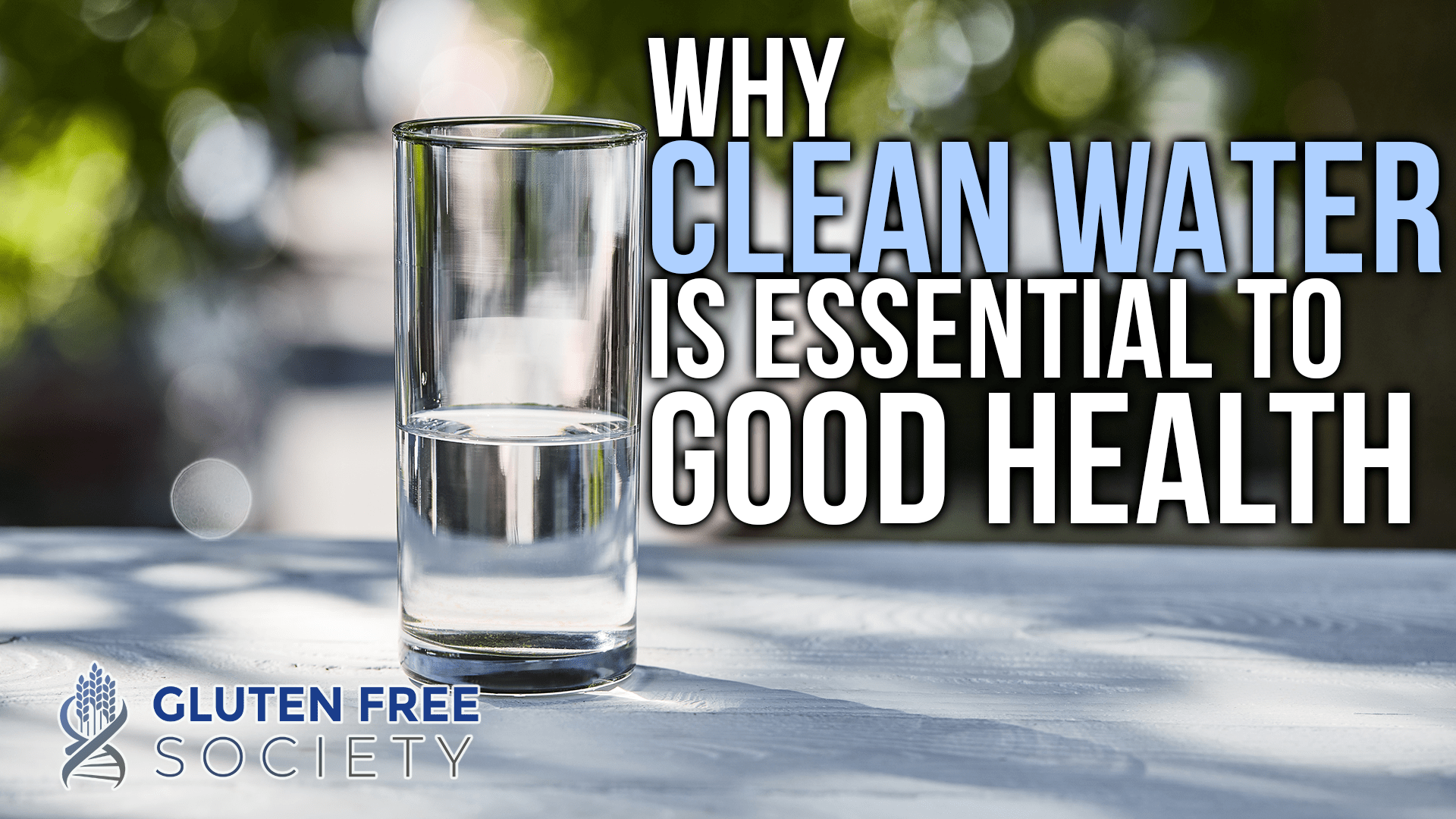
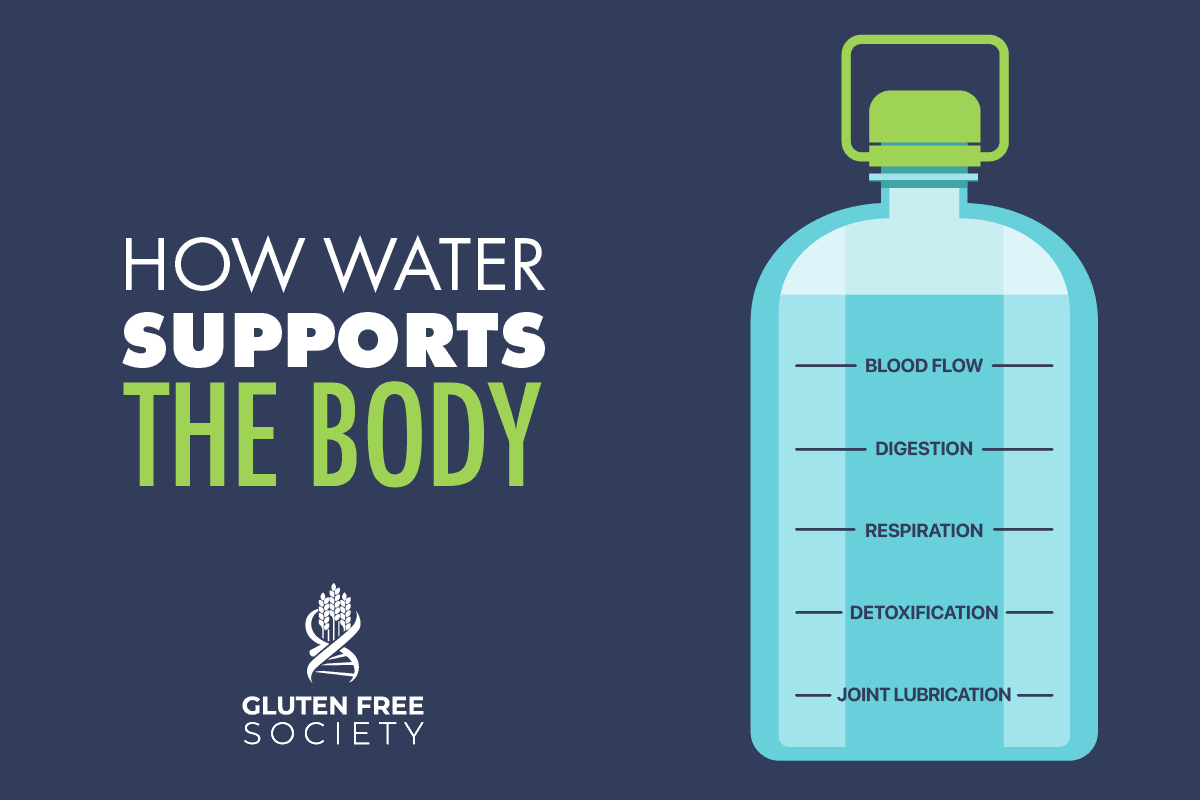 Blood flow
With water making up such a large portion of body composition, it is absolutely critical to keeping the fluids of the body functioning properly. This includes blood flow and circulation throughout the body, especially to the brain and heart.
Research shows that dehydration can lead to inflammation, reduce blood vessel function, and affect the health of your arteries. These effects can impact the function of the heart, brain, and blood pressure.
In fact, this is why dehydration can lead to headaches. Dehydration lowers blood flow and oxygen to the brain which leads to dilated blood vessels in the brain that increase swelling and inflammation.
Digestion
Water and other liquids help break down food so that your body can absorb the nutrients. Water also softens the stool and helps keep food moving through the digestive tract to prevent constipation. Without adequate water,
While some express concern that water will dilute digestive juices or interfere with digestion if you drink with a meal, this is not the case. In fact, drinking water during or after a meal actually aids digestion. Unless your own provider has told you to avoid water with meals for a specific health reason, drink up!
Respiration
Water helps to thin the mucus lining your airways and lungs. Therefore, an insufficient amount of water can cause the mucus lining to thicken and get sticky, which slows down overall respiration. Slowed respiration negatively impacts a number of respiratory issues, like susceptibility to illness and allergies and increased risk for other respiratory problems.
Water’s role in respiration is also underscored by its increased need during physical activity. Research shows that the amount of exhaled water is approximately four times higher during activity that raises the heart rate to 140 beats per minute than during the rest.
Detoxification
I’m not talking about a juice cleanse here. I’m talking about supporting the natural detoxification pathways that your body already has – the lungs, skin, digestive system, liver, and kidneys. Through these organs and systems, your body filters out what it doesn’t need and excretes it through sweat, urine, and bowel movements.
Your body requires water to effectively carry out these functions. Sweat regulates body temperature and water is essential to replenish the lost fluid from sweat. Adequate water intake helps your kidneys work more efficiently to excrete unnecessary material from urine, and it also helps move waste through your bowels. Without sufficient water intake, your body will pull water from the colon and bowels become harder and more difficult to pass.
Joint lubrication
Water helps to lubricate and cushion your joints, spinal cord, and tissues. Lubricated joints are essential for comfortable movement, safe physical activity, and prevention of certain related conditions like arthritis.
How Gluten Can Damage These Same Functions
For as critical as water is to these systems and functions, gluten can actually damage or hinder the function of blood flow, digestion, respiration, detox, and joints. Here’s a quick look at how:
Blood flow
With water making up such a large portion of body composition, it is absolutely critical to keeping the fluids of the body functioning properly. This includes blood flow and circulation throughout the body, especially to the brain and heart.
Research shows that dehydration can lead to inflammation, reduce blood vessel function, and affect the health of your arteries. These effects can impact the function of the heart, brain, and blood pressure.
In fact, this is why dehydration can lead to headaches. Dehydration lowers blood flow and oxygen to the brain which leads to dilated blood vessels in the brain that increase swelling and inflammation.
Digestion
Water and other liquids help break down food so that your body can absorb the nutrients. Water also softens the stool and helps keep food moving through the digestive tract to prevent constipation. Without adequate water,
While some express concern that water will dilute digestive juices or interfere with digestion if you drink with a meal, this is not the case. In fact, drinking water during or after a meal actually aids digestion. Unless your own provider has told you to avoid water with meals for a specific health reason, drink up!
Respiration
Water helps to thin the mucus lining your airways and lungs. Therefore, an insufficient amount of water can cause the mucus lining to thicken and get sticky, which slows down overall respiration. Slowed respiration negatively impacts a number of respiratory issues, like susceptibility to illness and allergies and increased risk for other respiratory problems.
Water’s role in respiration is also underscored by its increased need during physical activity. Research shows that the amount of exhaled water is approximately four times higher during activity that raises the heart rate to 140 beats per minute than during the rest.
Detoxification
I’m not talking about a juice cleanse here. I’m talking about supporting the natural detoxification pathways that your body already has – the lungs, skin, digestive system, liver, and kidneys. Through these organs and systems, your body filters out what it doesn’t need and excretes it through sweat, urine, and bowel movements.
Your body requires water to effectively carry out these functions. Sweat regulates body temperature and water is essential to replenish the lost fluid from sweat. Adequate water intake helps your kidneys work more efficiently to excrete unnecessary material from urine, and it also helps move waste through your bowels. Without sufficient water intake, your body will pull water from the colon and bowels become harder and more difficult to pass.
Joint lubrication
Water helps to lubricate and cushion your joints, spinal cord, and tissues. Lubricated joints are essential for comfortable movement, safe physical activity, and prevention of certain related conditions like arthritis.
How Gluten Can Damage These Same Functions
For as critical as water is to these systems and functions, gluten can actually damage or hinder the function of blood flow, digestion, respiration, detox, and joints. Here’s a quick look at how:
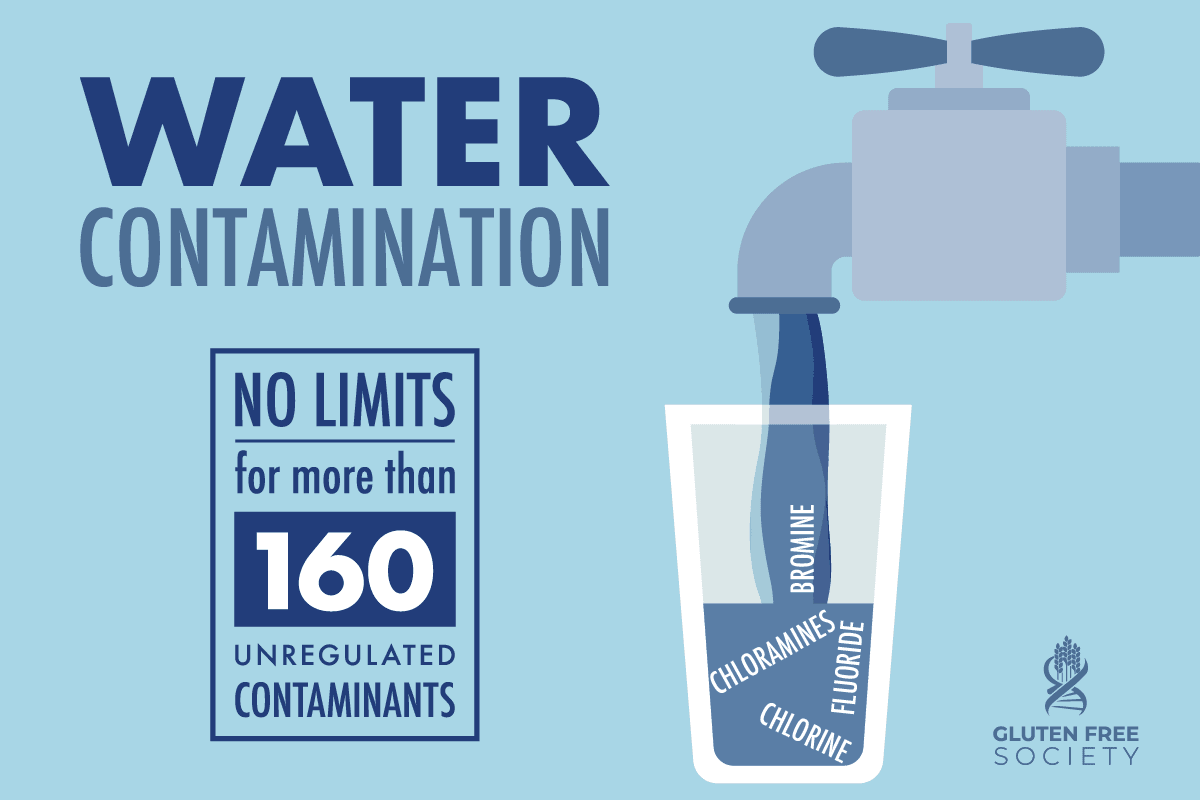 Water contamination concerns
Unfortunately, as critical as water is to our health, our water supply is inherently contaminated and the regulatory system meant to ensure the safety of America’s drinking water is ineffective and motivated by factors other than the health of the people drinking the water.
While recent years have introduced a number of new toxic chemicals into our water supply, the EPA has not added any new contaminants to the toxic chemicals covered by the Safe Drinking Water Act. Furthermore, there are no legal limits for more than 160 unregulated contaminants in U.S. tap water. For some other chemicals, the EPA’s Maximum Contaminant Levels, or MCLs, haven’t been updated in almost 50 years.
These toxins come from groundwater contamination of pesticides and other environmental chemicals that disrupt hormones, as well as common toxins added to water like fluoride, chlorine, chloramines, and bromine. The Environmental Working Group (EWG) provides more information on the risks of these chemicals and the current state of water in America.
Water contamination concerns
Unfortunately, as critical as water is to our health, our water supply is inherently contaminated and the regulatory system meant to ensure the safety of America’s drinking water is ineffective and motivated by factors other than the health of the people drinking the water.
While recent years have introduced a number of new toxic chemicals into our water supply, the EPA has not added any new contaminants to the toxic chemicals covered by the Safe Drinking Water Act. Furthermore, there are no legal limits for more than 160 unregulated contaminants in U.S. tap water. For some other chemicals, the EPA’s Maximum Contaminant Levels, or MCLs, haven’t been updated in almost 50 years.
These toxins come from groundwater contamination of pesticides and other environmental chemicals that disrupt hormones, as well as common toxins added to water like fluoride, chlorine, chloramines, and bromine. The Environmental Working Group (EWG) provides more information on the risks of these chemicals and the current state of water in America.
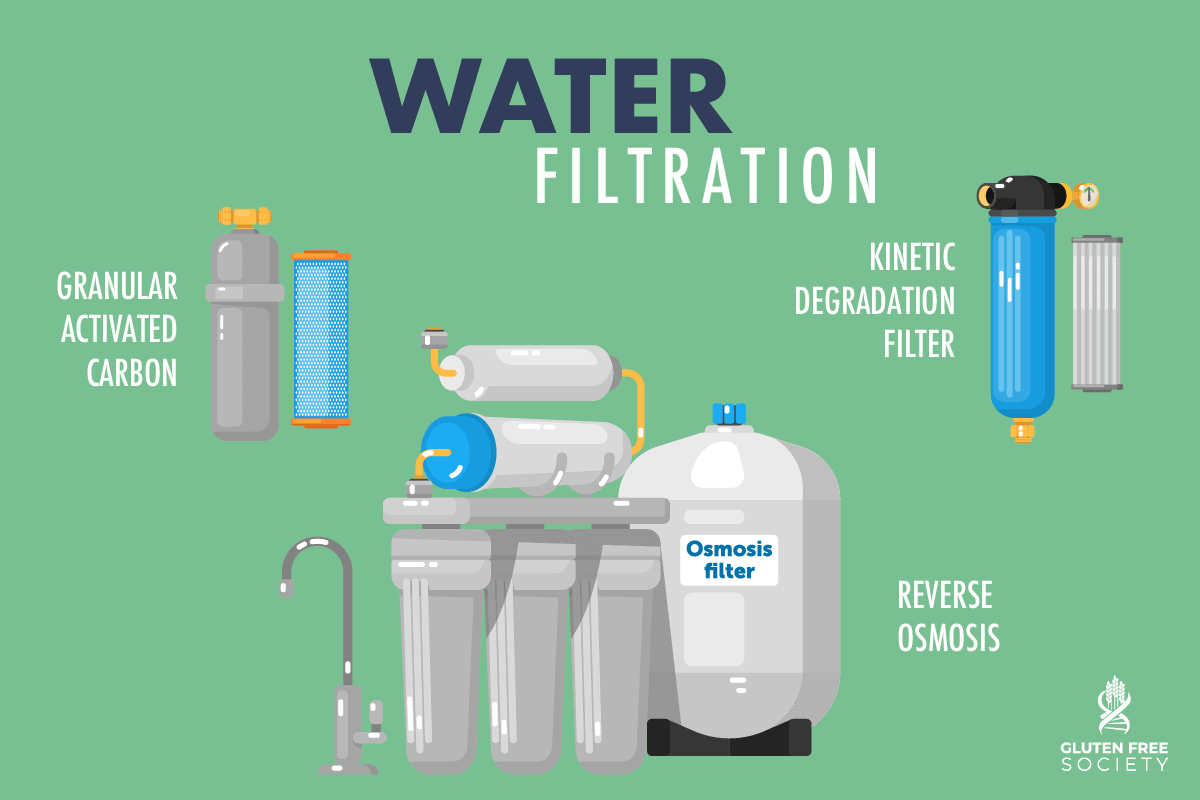 Water filtration
There are a number of water filtration options available and they range significantly in price and quality. The EWG is a great resource to evaluate different systems and also to search your zip code to see what contaminants exist in your water supply.
I am personally in favor of three types in particular: granular activated carbon, KDF, and reverse osmosis filtration symptoms.
Water filtration
There are a number of water filtration options available and they range significantly in price and quality. The EWG is a great resource to evaluate different systems and also to search your zip code to see what contaminants exist in your water supply.
I am personally in favor of three types in particular: granular activated carbon, KDF, and reverse osmosis filtration symptoms.
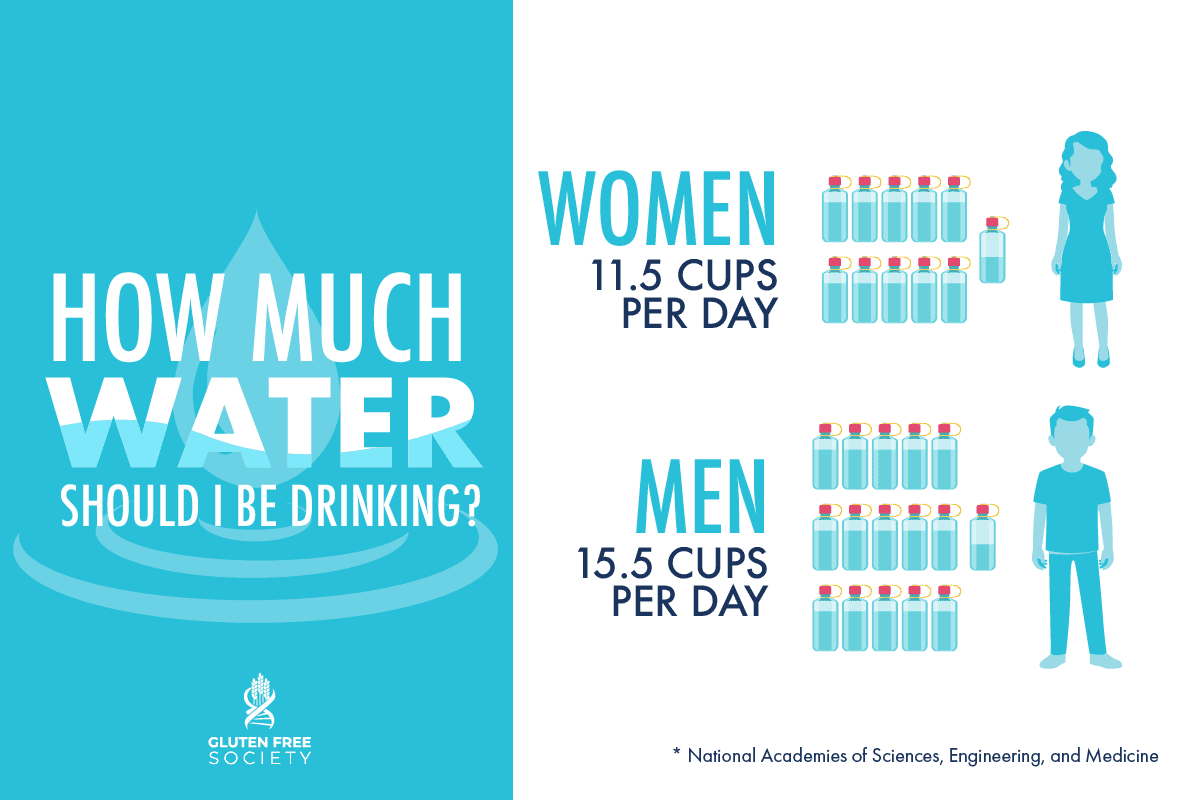 How Much Should You Drink?
The general guideline for water consumption from the National Academies of Sciences, Engineering, and Medicine is 15.5 cups per day for men and 11.5 cups per day for women. This recommendation refers to all fluids which can come from water, other unsweetened beverages like herbal tea, coconut water, and bone broth, and whole foods with high water content, like fruits and vegetables.
However, these are general guidelines that group all men and women into one category. Clearly, needs are higher for some populations than others. This may include those who are physically active, live in warm or dry climates or at high altitude, and pregnant women.
You can also gauge your intake and needs by tuning into your own thirst cues. We often misread thirst for hunger, so try water first before reaching for a snack next time. You can also pay attention to the color of your urine to get personalized feedback on how hydrated you are.
If the color of your urine is very pale yellow to light yellow, you’re well hydrated. Darker yellow urine is a sign of dehydration.
Drink Up!
Now that you understand why water is so important and how it supports so many critical functions in the body, go grab a glass!
How Much Should You Drink?
The general guideline for water consumption from the National Academies of Sciences, Engineering, and Medicine is 15.5 cups per day for men and 11.5 cups per day for women. This recommendation refers to all fluids which can come from water, other unsweetened beverages like herbal tea, coconut water, and bone broth, and whole foods with high water content, like fruits and vegetables.
However, these are general guidelines that group all men and women into one category. Clearly, needs are higher for some populations than others. This may include those who are physically active, live in warm or dry climates or at high altitude, and pregnant women.
You can also gauge your intake and needs by tuning into your own thirst cues. We often misread thirst for hunger, so try water first before reaching for a snack next time. You can also pay attention to the color of your urine to get personalized feedback on how hydrated you are.
If the color of your urine is very pale yellow to light yellow, you’re well hydrated. Darker yellow urine is a sign of dehydration.
Drink Up!
Now that you understand why water is so important and how it supports so many critical functions in the body, go grab a glass!
Stay up-to-date with the latest articles, tips, recipes and more.

*These statements have not been evaluated by the Food and Drug Administration. This product is not intended to diagnose, treat, cure or prevent any disease.
If you are pregnant, nursing, taking medication, or have a medical condition, consult your physician before using this product.
The entire contents of this website are based upon the opinions of Peter Osborne, unless otherwise noted. Individual articles are based upon the opinions of the respective author, who retains copyright as marked. The information on this website is not intended to replace a one-on-one relationship with a qualified health care professional and is not intended as medical advice. It is intended as a sharing of knowledge and information from the research and experience of Peter Osborne and his community. Peter Osborne encourages you to make your own health care decisions based upon your research and in partnership with a qualified health care professional.
2 Responses
I enjoyed this topic of water. I have learned quite a bit. I have a whole house system and will ask the owner of his company some questions regarding what his system actually does. Thank you.
What do you think about the rumors going around about Brita and other water filters have of gluten in them? Supposedly the starch used as a binder is the cause.